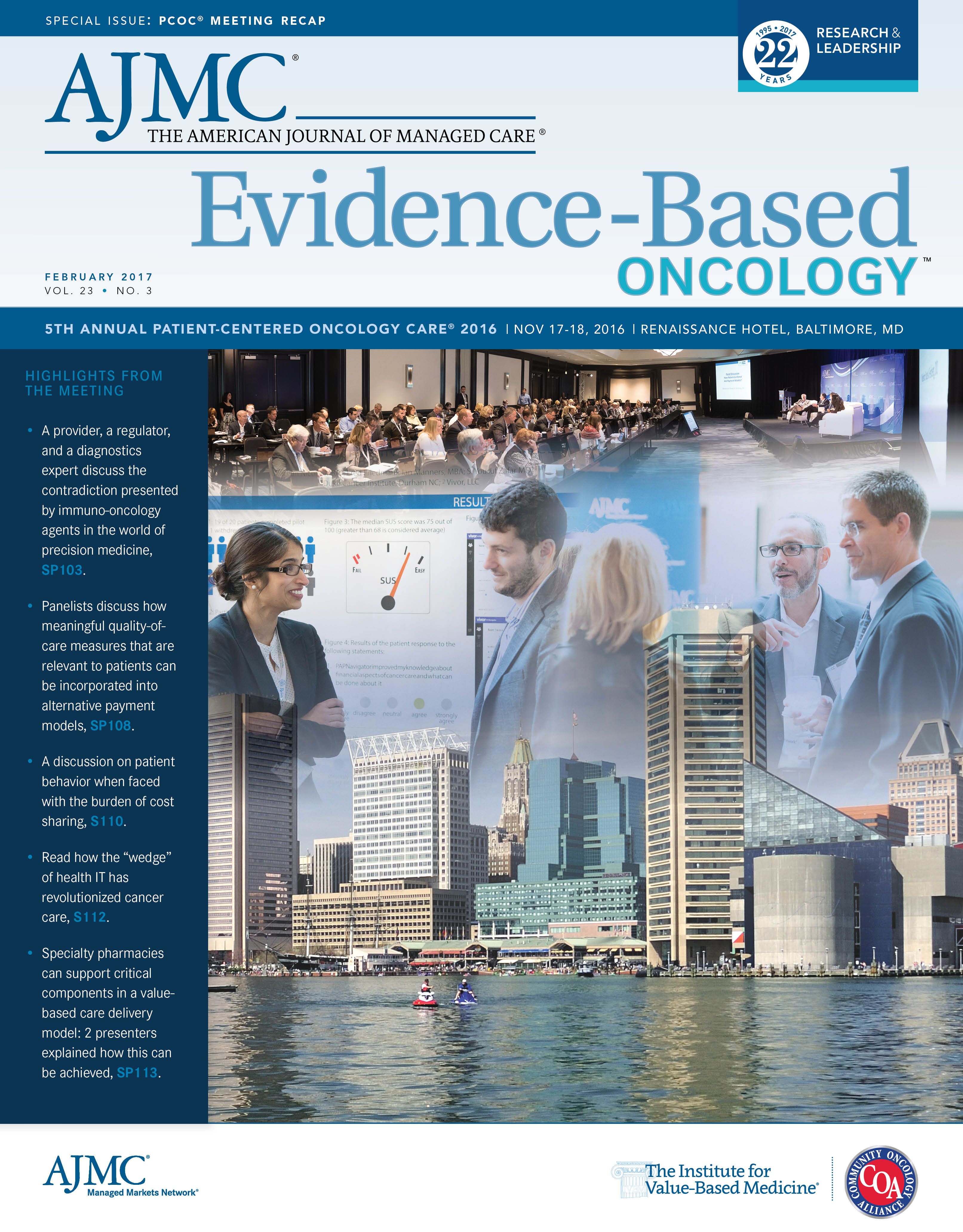- Center on Health Equity & Access
- Clinical
- Health Care Cost
- Health Care Delivery
- Insurance
- Policy
- Technology
- Value-Based Care
TAPUR Trial Expands Who Can Join Clinical Trials, If Payers Fund Genomic Tests
Pam Mangat, MS, associate director for the TAPUR study in the research and analysis division of the American Society of Clinical Oncology, offered an update on the study at the 5th annual Patient-Centered Oncology Care® meeting.
WITH TAPUR, THE AMERICAN SOCIETY OF CLINICAL ONCOLOGY
(ASCO) is pushing the boundaries of who can take part in a clinical trial. Things like being a teenager and a past cancer patient are coming down as barriers—in some cases, even patients with HIV can take part.
But one hurdle—payer coverage—could keep some participants out of the study, whose formal name, Targeted Agent and Profiling Utilization Registry, describes its mission of finding new groups of patients who could benefit from existing cancer drugs, based on their genetic profile.
Pam Mangat, MS, associate director for TAPUR in the research and analysis division of ASCO, offered an update on the study at Patient-Centered Oncology Care® (PCOC®), which took place November 17-18, 2016, in Baltimore, Maryland.
TAPUR seeks to push the envelope of precision medicine in several ways: first, it gives community oncologists and their patients free access to new therapies that have been approved by FDA for 1 or more uses, but show potential for off-label use based on common genetic variants. Second, the trial seeks patients who look more like a real-world population. Finally, TAPUR will educate oncologists from more remote locations and community settings about the process of precision medicine.
The study targets patients with advanced solid tumors, B-cell non-Hodgkins lymphoma, or multiple myeloma who have exhausted current approved treatment options. As Mangat explained, once the oncologist has the patient’s genomic test results, if a variant is identified that could suggest a match to one of the 17 drugs being studied in TAPUR, the physician can consult with a volunteer tumor board convened by ASCO to see if the patient’s participation is appropriate.
TAPUR’s protocol calls for cancer patients to have a genomic test in hand to be screened for the trial. But if a patient’s insurer won’t fund the test, the chance to gain access to the study drugs could be lost. “This is a challenge in our study,” Mangat said. Yet, payers are among the stakeholders who stand to benefit from TAPUR, she said, because they will gain data on test and drug use to inform future coverage decisions.
There are some examples of test coverage: Priority Health in Michigan will pay for genomic tests for participants in that state, and Carolinas HealthCare System has reached an agreement with the test maker Caris Life Sciences to limit out-of-pocket costs for those taking part in North Carolina. As TAPUR expands to 63 participating sites by the end of 2016, Mangat emphasized that the study is “test agnostic,” meaning it doesn’t prefer a single manufacturer, and that it will use earlier tests instead of requiring a fresh biopsy when a patient is screened for the study.
TAPUR will study 17 different cancer drugs in 15 separate therapeutic regimens. So far, 170 patients have registered and 102 were taking study drugs at the time of PCOC®. Initial cohorts of up to 10 patients are being created, with the patients each taking the same drug for the same cancer based on the same genetic variant. Right now, of course, many cohorts only have 1 patient; Mangat said that as the study evolves, some cohorts may be combined, while others will add 18 patients if at least 2 patients respond to the drug. If 7 patients in that larger group respond, this would indicate a signal, she said.
The study benefits community oncologists and their patients by moving precision medicine beyond major academic centers, Mangat explained. “Not all oncologists have access to an in-house lab,” she said. The ability to work with the trial’s tumor board to decide whether a patient’s genomic test reveals an actionable mutation will be a valuable experience for many oncologists, Mangat added.
But TAPUR’s most intriguing feature may be a protocol that allows oncologists to cast a much larger net for potential participants. The study, Mangat said, “has wider criteria for acceptable organ function,” and some of the drugs involved can be studied on patients with HIV or brain metastases, if they meet certain criteria. Mangat was especially excited about upcoming plans to include teenagers in the study. “We’ve been working with our pharmaceutical companies,” she said. ASCO asked, “Can we lower the age if there is some dosing established for your drug? And the response was very positive.”
“We are planning to lower the age to 12 years old,” by early 2017, she said. 


